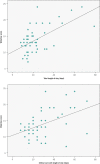A prospective cohort study of risk prediction in simultaneous pancreas and kidney transplantation
- PMID: 26274754
- PMCID: PMC5126239
- DOI: 10.1308/rcsann.2015.0001
A prospective cohort study of risk prediction in simultaneous pancreas and kidney transplantation
Abstract
Introduction: Current risk prediction scoring systems in pancreas transplantation are limited to organ factors and are specific to predicting graft outcome. They do not consider recipient factors or inform regarding recipient morbidity. The aim of this study was to assess the utility of commonly used general surgical risk prediction models (P-POSSUM [Portsmouth Physiological and Operative Severity Score for the enUmeration of Mortality and morbidity], MODS [multiple organ dysfunction score], Charlson co-morbidity index, revised cardiac risk index, ASA [American Society of Anesthesiologists] grade and Waterlow score), and to correlate them with total length of hospital stay (LOS) and critical care unit (CCU) LOS, important surrogate markers of patient outcome.
Methods: All risk prediction scores were calculated prospectively for all simultaneous pancreas and kidney (SPK) transplant recipients from November 2011 to October 2013, and correlated with outcome measures.
Results: Overall, 57 SPK transplant recipients were analysed. The mean age was 42.0 years (standard deviation [SD]: 7.60 years), 27 (52%) were male and the mean body mass index was 25.43kg/m(2) (SD: 3.11kg/m(2)). The mean pancreas and kidney cold ischaemic times were 703 minutes (SD: 182 minutes) and 850 minutes (SD: 192 minutes) respectively. The median total LOS and mean CCU LOS was 17 days (range: 8-79 days) and 7 days (SD: 4.04 days) respectively. When correlated with risk prediction scores, Waterlow score was the only significant predictor of total LOS and CCU LOS (p<0.001 [Spearman's correlation] and p=0.001 [Pearson's correlation] respectively).
Conclusions: Preoperative risk prediction plays an important part in planning perioperative care. To date, no validated risk prediction scoring system exists for SPK transplantation. This prospective study indicates that Waterlow score identifies high risk individuals and has value in the prediction of outcome following SPK transplantation.
Keywords: Outcome assessment; Pancreas transplantation; Risk.
Figures
References
-
- Charlson ME, Sax FL, MacKenzie CR, et al. . Morbidity during hospitalization: can we predict it? J Chronic Dis 1987; : 705–712. - PubMed
-
- Copeland GP, Jones D, Walters M. POSSUM: a scoring system for surgical audit. Br J Surg 1991; : 355–360. - PubMed
-
- Marshall JC, Cook DJ, Christou NV, et al. . Multiple organ dysfunction score: a reliable descriptor of a complex clinical outcome. Crit Care Med 1995; : 1,638–1,652. - PubMed
-
- Charlson ME, Pompei P, Ales KL, MacKenzie CR. A new method of classifying prognostic comorbidity in longitudinal studies: development and validation. J Chronic Dis 1987; : 373–383. - PubMed
-
- Lee TH, Marcantonio ER, Mangione CM, et al. . Derivation and prospective validation of a simple index for prediction of cardiac risk of major noncardiac surgery. Circulation 1999; : 1,043–1,049. - PubMed
MeSH terms
LinkOut - more resources
Full Text Sources
Other Literature Sources
Medical


